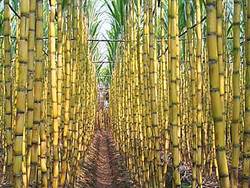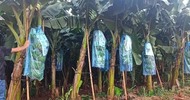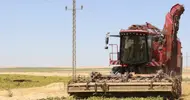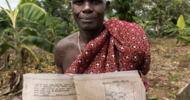Mid-South Farmer | October 20, 2011
Brazil's new land policy
Pam Golden
I'm betting the current furor will end up dying down once Congressman Beto Faro's report is in. He's the Workers Party legislator in Brazil, tasked with measuring just how much foreigners control Brazilian farmland.
He was supposed to report his findings to a special committee tackling the issue, but his report has been moved back to the end of the month. I'll be watching closely. My guess is that, once the committee decides a final rule, cooler heads will prevail. A lot like the way the passport issue flared up here a few years ago.
The passport problem started when the U.S. made visitors from some counties—including Brazil—go through extra security steps upon entering the country. Among those steps was swiping your fingerprint over a scanner and getting a quick snapshot taken.
The Brazilians overreacted. A judge brought about near paralysis at Brazilian customs after he decreed Brazil would retaliate against the discrimination. Starting the next day, unprepared Federal Police separated U.S. citizens from the passport lines, and took their fingerprints on ink blotters. They snapped travel-weary tourists' pictures with a 35mm camera, and lines at passport control snaked around corners. This mess lasted for a couple of weeks until the furor died down and the "U.S. Citizens Here" lines just sort of went away. After all, American tourists spend more per day than any other nationality in the world, so why make it tougher on them?
The land scare
That's rather like what's going on here right now in terms of foreigners buying land. A few years ago, before anyone had ever thought to talk about investing in BRIC countries, Brazil was eager for foreign investment. And so a seemingly simple rule was adopted: all Brazilian companies are to be treated equally. Sounds straightforward, right?
Don't answer that yet, because foreigners began setting up Brazilian companies in a 99/1 partnership with Brazilians to buy land here, and those companies are treated just like any other domestic company—including the right to buy land. So nobody knew exactly how much control foreigners had over how much Brazilian farmland.
Sure, it's guessed that individual foreigners, like me, own some 10.6 million acres, spread out over 35,000 properties. But how much land is in the hands of 99-percent foreign-owned Brazilian companies? Since they're treated like any other Brazilian company, there's no special log of whether they've got foreign stockholders or not.
So headlines and news pieces began to appear—almost as if journalists had been given the story line all at once—about how Brazil has no control over foreigners buying the nation's farmland, and that nobody even knows how much land in the country is controlled by foreigners.
As a result, the attorney general's office clamped down with some new rules in August of 2010. Until and unless Congressman Beto Faro's subcommittee comes back with some new, permanent and clear rules, no foreign-controlled company can hold more than 12,350 acres—and all foreigners would need permission from the government to buy anything more than about 12 acres.
Clear rules to follow
As you might guess, it's not just the draconian regs on foreign land ownership that are the problem. If you're a multinational company wanting to get in and help a desperate Brazil improve its desperately-neglected sugarcane production capacity so that fuel pump prices (and, consequently, inflation,) come down, you need to know what you can buy, and what you can't.
Or if you're a multinational that lends money for ag purchases, like equipment or even cropping costs, you need to be able to consider land as collateral.
As a foreign landowner myself, I hope Beto Faro's report leads to the subcommittee finishing its work and establishing clear—and reasonable—guidelines on foreign land ownership. Then, like the case of the passports, things would quietly ease out of panic mode, and business would find its equilibrium with reasonable and clear rules.
But if that doesn't turn out to be the case, I may have to sell my farm to my wife, a Brazilian national. Big agribusiness involved in alternative fuels or credit may not have such an easy solution in their back pocket.
Brazil's new land policy
Pam Golden
I'm betting the current furor will end up dying down once Congressman Beto Faro's report is in. He's the Workers Party legislator in Brazil, tasked with measuring just how much foreigners control Brazilian farmland.
He was supposed to report his findings to a special committee tackling the issue, but his report has been moved back to the end of the month. I'll be watching closely. My guess is that, once the committee decides a final rule, cooler heads will prevail. A lot like the way the passport issue flared up here a few years ago.
The passport problem started when the U.S. made visitors from some counties—including Brazil—go through extra security steps upon entering the country. Among those steps was swiping your fingerprint over a scanner and getting a quick snapshot taken.
The Brazilians overreacted. A judge brought about near paralysis at Brazilian customs after he decreed Brazil would retaliate against the discrimination. Starting the next day, unprepared Federal Police separated U.S. citizens from the passport lines, and took their fingerprints on ink blotters. They snapped travel-weary tourists' pictures with a 35mm camera, and lines at passport control snaked around corners. This mess lasted for a couple of weeks until the furor died down and the "U.S. Citizens Here" lines just sort of went away. After all, American tourists spend more per day than any other nationality in the world, so why make it tougher on them?
The land scare
That's rather like what's going on here right now in terms of foreigners buying land. A few years ago, before anyone had ever thought to talk about investing in BRIC countries, Brazil was eager for foreign investment. And so a seemingly simple rule was adopted: all Brazilian companies are to be treated equally. Sounds straightforward, right?
Don't answer that yet, because foreigners began setting up Brazilian companies in a 99/1 partnership with Brazilians to buy land here, and those companies are treated just like any other domestic company—including the right to buy land. So nobody knew exactly how much control foreigners had over how much Brazilian farmland.
Sure, it's guessed that individual foreigners, like me, own some 10.6 million acres, spread out over 35,000 properties. But how much land is in the hands of 99-percent foreign-owned Brazilian companies? Since they're treated like any other Brazilian company, there's no special log of whether they've got foreign stockholders or not.
So headlines and news pieces began to appear—almost as if journalists had been given the story line all at once—about how Brazil has no control over foreigners buying the nation's farmland, and that nobody even knows how much land in the country is controlled by foreigners.
As a result, the attorney general's office clamped down with some new rules in August of 2010. Until and unless Congressman Beto Faro's subcommittee comes back with some new, permanent and clear rules, no foreign-controlled company can hold more than 12,350 acres—and all foreigners would need permission from the government to buy anything more than about 12 acres.
Clear rules to follow
As you might guess, it's not just the draconian regs on foreign land ownership that are the problem. If you're a multinational company wanting to get in and help a desperate Brazil improve its desperately-neglected sugarcane production capacity so that fuel pump prices (and, consequently, inflation,) come down, you need to know what you can buy, and what you can't.
Or if you're a multinational that lends money for ag purchases, like equipment or even cropping costs, you need to be able to consider land as collateral.
As a foreign landowner myself, I hope Beto Faro's report leads to the subcommittee finishing its work and establishing clear—and reasonable—guidelines on foreign land ownership. Then, like the case of the passports, things would quietly ease out of panic mode, and business would find its equilibrium with reasonable and clear rules.
But if that doesn't turn out to be the case, I may have to sell my farm to my wife, a Brazilian national. Big agribusiness involved in alternative fuels or credit may not have such an easy solution in their back pocket.














